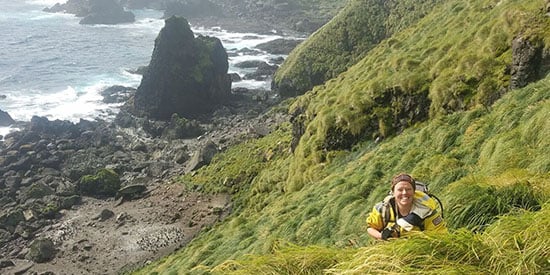Deakin graduate spends a year on Macquarie Island
Deakin news
After spending 12 months studying bird populations on Macquarie Island, Warrnambool biologist and researcher Melanie Wells is already planning her next visit to the remote sub-Antarctic location.
After spending 12 months studying bird populations on Macquarie Island, Warrnambool biologist and researcher Melanie Wells is already planning her next visit to the remote sub-Antarctic location.
A graduate of Deakin University’s Environmental Science and Marine Biology course in Warrnambool, Ms Wells has followed her passion for protecting marine bird life.
Ms Wells has recently returned from her 12-month stint as a volunteer research assistant as part of a Tasmanian Department for Primary Industries, Parks, Water and Environment monitoring program on the conservation and status of Macquarie Island’s albatrosses and giant petrels.
Macquarie Island is in the Southern Ocean, about half way between Australia and Antarctica, and is about 34 km long and up to five km wide.
Ms Wells described the year on the island as an amazing and incredible experience.
‘It was lovely to be on this tiny island surrounded by thousands of kilometres of ocean and that’s it,’ she said.
Ms Wells was part of a 15-member expedition team, supplemented only by a few expeditioners over summer. But with huge colonies of seals and birdlife over summer she said the island was always busy.
‘I thought I was going to have all this solitude, but I was with a team of 15 all the time so it was quite the opposite,’ she said. ‘It never really felt that isolated.’
The monitoring program has been running for 23 years and the island’s habitat was boosted after a pest-eradication program from 2011 to 2014 to eliminate rats, mice and rabbits.
‘It’s long-term monitoring,’ Ms Wells said. ‘The current monitoring program is documenting the birds’ response as the nesting habitat recovers, post rabbit eradication.’
Ms Wells said a typical day of work consisted of communicating with the main base through VHF radio then starting with an uphill walk to count and resight nesting birds.
‘The majority of the day we spent planning what gourmet field dinners we were going to create and finding the perfect lunch spot, she said.’ Ms Wells is now back in Warrnambool but hopes to return to Macquarie Island for next summer.
‘It’s an incredible place,’ she said. ‘There are millions of birds and seals; the wildlife is so incredibly abundant. All these amazing animals live in the Southern Ocean and must come on land to breed.
‘The Sub-Antarctic Islands are the only refugia for the animals to breed within, and so these small islands are incredibly abundant with wildlife throughout the summer months.’
Ms Wells copes well with the challenge of working in such a spectacular wilderness.
‘The temperatures are not too extreme,’ she said. ‘It’s at 54 degrees south and people in the northern hemisphere live at those latitudes.’
The one thing that makes it extreme is the wind, but Ms Wells has had ample opportunity to prepare.
‘There are no other land masses surrounding it, so it’s incredibly windy,’ she said. ‘Warrnambool hardened me for that, but it’s much worse.’
Ms Wells also completed her Honours through Deakin University and has since then continued working in the bird conservation field, she plans to begin her PhD in the coming years.
Share this story

